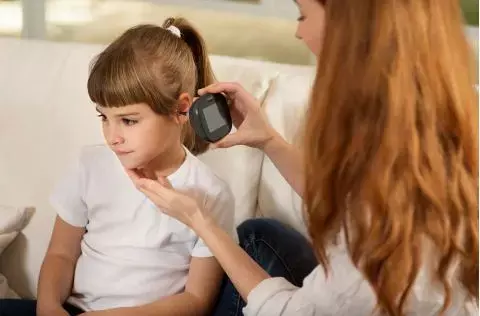- Home
- Medical news & Guidelines
- Anesthesiology
- Cardiology and CTVS
- Critical Care
- Dentistry
- Dermatology
- Diabetes and Endocrinology
- ENT
- Gastroenterology
- Medicine
- Nephrology
- Neurology
- Obstretics-Gynaecology
- Oncology
- Ophthalmology
- Orthopaedics
- Pediatrics-Neonatology
- Psychiatry
- Pulmonology
- Radiology
- Surgery
- Urology
- Laboratory Medicine
- Diet
- Nursing
- Paramedical
- Physiotherapy
- Health news
- Fact Check
- Bone Health Fact Check
- Brain Health Fact Check
- Cancer Related Fact Check
- Child Care Fact Check
- Dental and oral health fact check
- Diabetes and metabolic health fact check
- Diet and Nutrition Fact Check
- Eye and ENT Care Fact Check
- Fitness fact check
- Gut health fact check
- Heart health fact check
- Kidney health fact check
- Medical education fact check
- Men's health fact check
- Respiratory fact check
- Skin and hair care fact check
- Vaccine and Immunization fact check
- Women's health fact check
- AYUSH
- State News
- Andaman and Nicobar Islands
- Andhra Pradesh
- Arunachal Pradesh
- Assam
- Bihar
- Chandigarh
- Chattisgarh
- Dadra and Nagar Haveli
- Daman and Diu
- Delhi
- Goa
- Gujarat
- Haryana
- Himachal Pradesh
- Jammu & Kashmir
- Jharkhand
- Karnataka
- Kerala
- Ladakh
- Lakshadweep
- Madhya Pradesh
- Maharashtra
- Manipur
- Meghalaya
- Mizoram
- Nagaland
- Odisha
- Puducherry
- Punjab
- Rajasthan
- Sikkim
- Tamil Nadu
- Telangana
- Tripura
- Uttar Pradesh
- Uttrakhand
- West Bengal
- Medical Education
- Industry
Digital Videoscopes and Smartphones show promise for Remote ENT Examinations: JAMA

In a recent development, researchers have highlighted that the use of Digital otoscopes and smartphones apparently can facilitate remote head and neck physical examination in telehealth. The team further concluded that Digital otoscopes were useful for ear examinations, and smartphone videos appeared to be the most useful for oropharyngeal examinations.
The interesting findings have been published in JAMA Otolaryngology Head & Neck Surgury.
To have an in depth understanding on this aspect,a prospective quality improvement study was conducted in an academic adult otolaryngology clinic including 23 patients who presented for an in-person appointment and owned a smartphone device. The study was conducted from July 1 to 15, 2020.Participants were asked to capture pictures and videos of their ear canals and oropharynx with digital videoscopes and their smartphones under real-time guidance over a telehealth platform. They were then surveyed about their experience.
The primary outcomes were ratings by health care clinicians and a blinded otolaryngologist reviewer of image acceptability. Secondary outcomes included participant time to image acquisition and willingness to purchase digital videoscopes for telehealth use.
Data analysis revealed the following facts.
- Of the 23 participants included, 14 were women (61%); mean age was 50 years (range, 21 to 80 years).
- Of the images obtained using the digital otoscope ear examination, 95% were considered acceptable by the health care clinicians and 91% were considered acceptable by the blinded reviewer; 16 participants (70%) reported that the otoscope was easy to use.
- The mean time to acquire images for both ears was 114 seconds (95% CI, 84-145 seconds).
- Twenty-one participants (91%) were willing to pay for a digital otoscope for telehealth use.
- For the oropharyngeal examination, a greater proportion of smartphone video examinations were considered acceptable by clinicians (63% acceptability) and the blinded reviewer (55%) compared with the digital endoscope (clinicians, 40%; blinded reviewer, 14%).
- The mean time required for the oropharyngeal examination smartphone video capture was shorter at 35 seconds compared with both the digital endoscope (difference, −27 seconds; 95% CI, −7 to −47 seconds) and smartphone photo capture (difference, −53 seconds; 95% CI, −20 to −87 seconds).
"The COVID-19 pandemic has provided impetus to establish robust alternatives to in-person clinic appointments and physical examination. Reducing contact between patients, clinicians, and clinic staff when possible may reduce the risk of transmission in health care facilities. Taken together, our results suggest that patient self-acquisition of useful images of the ear using digital otoscopes and of the oropharynx using smartphones is feasible and achievable. These approaches are applicable in a broad range of practices and may possibly expand the utility of telehealth visits. Additional benefits for patients include eliminating travel time or costs, time taken off from work, and other potential direct and indirect costs. Future studies should also investigate the applicability of these strategies during in-hospital consultations and postoperative care."wrote the authors.
For the full article follow the link: Cai Y, Zheng YJ, Gulati A, et al. Patient Use of Low-Cost Digital Videoscopes and Smartphones for Remote Ear and Oropharyngeal Examinations. JAMA Otolaryngol Head Neck Surg. Published online January 21, 2021. doi:10.1001/jamaoto.2020.5223
Primary source: JAMA Otolaryngology
Dr Satabdi Saha (BDS, MDS) is a practicing pediatric dentist with a keen interest in new medical researches and updates. She has completed her BDS from North Bengal Dental College ,Darjeeling. Then she went on to secure an ALL INDIA NEET PG rank and completed her MDS from the first dental college in the country – Dr R. Ahmed Dental College and Hospital. She is currently attached to The Marwari Relief Society Hospital as a consultant along with private practice of 2 years. She has published scientific papers in national and international journals. Her strong passion of sharing knowledge with the medical fraternity has motivated her to be a part of Medical Dialogues.
Dr Kamal Kant Kohli-MBBS, DTCD- a chest specialist with more than 30 years of practice and a flair for writing clinical articles, Dr Kamal Kant Kohli joined Medical Dialogues as a Chief Editor of Medical News. Besides writing articles, as an editor, he proofreads and verifies all the medical content published on Medical Dialogues including those coming from journals, studies,medical conferences,guidelines etc. Email: drkohli@medicaldialogues.in. Contact no. 011-43720751


